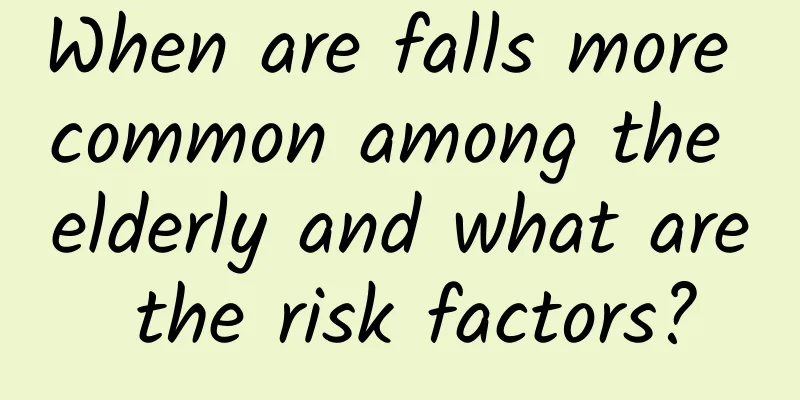When are falls more common among the elderly and what are the risk factors?

|
Falls are sudden, involuntary, unintentional changes in body position to the ground or a lower surface and are the second leading cause of death from accidental or unintentional injuries. Everyone can be injured in a fall. However, the type and severity of injuries vary depending on a person's age, gender, and health status. Adults over 60 years old account for the largest proportion of fatal falls. The incidence of falls among the elderly is high. The "China Injury Prevention Report" shows that the incidence of falls among the elderly has reached 20.7%. Falls among the elderly have serious consequences. In addition to causing death, they also bring negative effects such as fractures, trauma, and fear of falling, affecting the elderly's physical and mental health and independent living ability, reducing their quality of life, and increasing the burden on families and society. It is one of the important causes of disability and death among the elderly. Many people think that as people age, their legs and feet become less flexible and falls are inevitable. But the fact is that falls in the elderly are not accidents, but are caused by potential risk factors. Therefore, falls in the elderly can be prevented and controlled! part1 What are the risk factors for falls in the elderly? There are many factors that lead to falls in the elderly, mainly environmental factors and individual factors. Environmental factors include slippery floors, dim light, and clutter on the floor; individual factors include physiological changes, illness, medication, and psychological factors. Age is one of the main risk factors for falls. From a physiological function perspective, the stability and balance of the elderly's gait will decline with age. At the same time, the degeneration of the central nervous system and skeletal muscle system, as well as many acute and chronic diseases and psychological factors, will cause leg and foot problems in the elderly and increase the risk of falls. part2 Where do falls often occur among the elderly? The places where the elderly fall are not always on rugged roads. More than 50% of the elderly fall in their homes, which we think are safe. The problem of elderly people falling out of bed has also become a key issue in hospital care. part3 When is the peak time for falls among the elderly? The time when the elderly people fall is not in the evening or late at night, but more often in the morning. |
<<: Digua Games: Top 20 popular Android models in August 2011
>>: Canaccord Genuity: iPhone 4 remains the best-selling smartphone in the US
Recommend
Why do you get pelvic inflammatory disease? What causes it?
When women suffer from gynecological inflammation...
Can I rub my belly after a cesarean section?
In order to avoid the pain of childbirth, more an...
Feeling a bit nauseous, am I pregnant?
For some women, they don’t want to have children ...
How long after sex can I detect pregnancy?
If you do not take protective measures during sex...
How long can I have sex after pelvic inflammatory disease
Pelvic inflammatory disease refers to inflammatio...
What are the causes of pain in the lower left abdomen of women?
Many women often experience abdominal pain. Some ...
Not all women can take Wuji Baifeng Pills
For many women, the medicine Wu Ji Bai Feng Wan i...
What are the dangers of amenorrhea in women
Amenorrhea in women has a great impact on physica...
How to treat an enlarged uterus?
An enlarged uterus is a common physical disease a...
What can women eat to improve uterine prolapse
The uterus is one of the most important organs of...
Is it suitable for running if you have uterine inflammation?
When a woman's uterus becomes inflamed, it is...
Women's private parts are actually susceptible to these pollution hazards?
The toxicity of chemical fiber components in unde...
Stomach ache with brown discharge
The presence of white secretions, that is, brown ...
Fallopian tube inflammation abdominal pain
The cause of female infertility is often due to p...
How to scientifically treat lung nodules? Here is a summary!
The treatment of pulmonary nodules has made signi...









